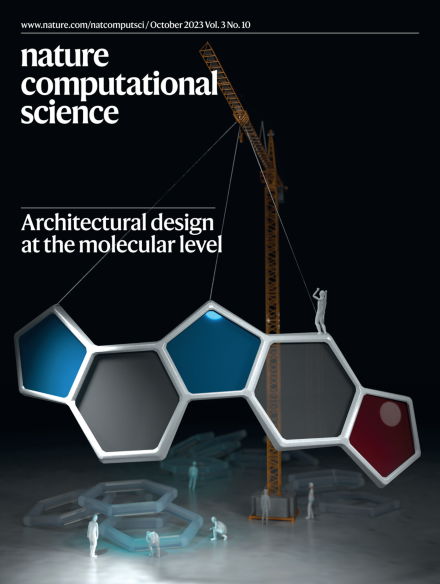
Renana Gershoni-Poranne introduces GaUDI for de novo molecular design
08.11.2023 08:53
Nature Computational Science magazine has published a paper from the group of Branco Weiss Fellow Renana Gershoni-Poranne and their collaborators titled “Guided diffusion for inverse molecular design”. The paper is featured on the cover of the October issue of the magazine.
Engineering molecules with clearly defined characteristics (i.e., de novo molecular design) – for use in drug therapies, sustainable fuels, light-weight composites, or wearable electronics – is the holy grail of materials science. High-throughput computational chemistry allows the virtual screening of millions of molecules, without having to synthesize them in the lab beforehand. The introduction of generative deep learning has greatly advanced efforts in this direction, yet molecular discovery remains challenging and often inefficient. The solution proposed by the authors is to invert the process. Rather than sifting through millions of molecules and testing each one to determine its properties, the aim should be to engineer structures that will have the desired properties – a process known as “inverse design”.
In their paper, Dr. Gershoni-Poranne’s group and their collaborators demonstrate a new approach for automatically designing new and better-performing molecules – with the introduction of GaUDI, a diffusion model for structure generation that is guided towards desired molecular properties by a neural network for property prediction. To train the diffusion model and the property predictor network, the researchers created a new computationally generated database of about 500,000 polycyclic aromatic molecules. Among GaUDI’s advantages is the flexibility of its targeting algorithm. It is possible to task it with any type of target, both point-wise and open-ended, or a combination of several properties. GaUDI shows improved conditional design, generating molecules with optimal properties and even going beyond the original distribution to suggest better molecules than those in the dataset.
Additionally, in an interview with Nature Synthesis magazine, Dr. Gershoni-Poranne Renana Gershoni-Poranne talks about probing aromatic molecules with computational tools.
Read the paper in Nature Computational Science
See the cover of Nature Computational Science
Read the interview in Nature Synthesis

